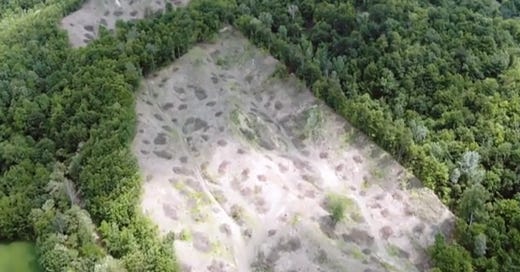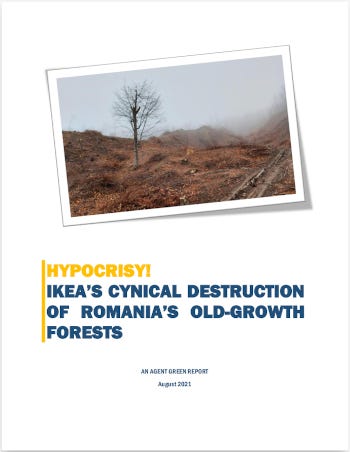IKEA and Romania: “It’s as if they really hate nature”
Part III: How IKEA destroys old-growth forests in Romania.

Since the 1950s, in its search for cheap raw material and cheap labour, IKEA has used wood from outside Sweden. IKEA currently sources 90% of its timber from outside Sweden.
In the 1980s, IKEA made clandestine, six-figure payments to the Securitate, Romania’s brutal secret police. Today, IKEA is the largest private forest landowner in Romania.
In its 2020 report, “Flatpacked Forests”, Earthsight investigates IKEA’s operations in Ukraine and Romania.
In 2017, IKEA was linked to illegal logging in Romania. A French TV documentary found that IKEA sourced timber from Schweighofer, an Austrian-owned firm.
In 2015, the Environmental Investigation Agency went undercover in Romania and filmed Schweighofer’s managers offering bonuses for supplying illegal wood. EIA described Schweighofer as “the single biggest driver of illegal logging in the country over the previous decade”.
Agent Green
The recent Arte documentary, “How IKEA is plundering the planet”, includes interviews with Gabriel Pãun, a biologist who works with the Romanian NGO Agent Green.
“It has become a really dangerous to investigate in the forests of Romania,” he says. “Over the years, I have been the victim of several violent attacks.”
In 2014, Pãun followed a truck loaded with wood from the Retezat National Park to show that Schweighofer was accepting wood from national parks and old-growth forest. At the time, Schweighofer was one of IKEA’s most important suppliers in Romania. The guards at the factory hit him and sprayed him with tear gas, even though he was filming on a public road.
“I have become a symbolic figure for forest defenders,” Pãun says. “I discovered that a price had been put on my head by poachers and loggers.”
In 2015, Pãun was with several members of his organisation, when about 10 men ambushed them. When they recognised Pãun, they tried to kill him. “They hit me as if I was a sack of potatoes,” he says. “I managed to get up and run. I heard them shouting, ‘He isn’t dead. Kill him!’ That’s how it is in Romania.”
The Romanian forest has become a battleground, with hundreds of assaults against nature defenders. Six foresters have been killed by timber traffickers.
In Romania, according to the Arte documentary, half of the timber harvested is cut without authorisation. Almost 20 million cubic metres of timber disappear illegally from Romanian forests every year. Once the timber is cut, legal and illegal timber is mixed - illegal and legal timber looks the same.
This is the country, then, plagued by forest crime, where IKEA decided to buy 50,000 hectares of forests.
A visit to IKEA’s forests
The Arte documentary team visit Cicãnești, one of IKEA’s forests. They find that forestry vehicles have made deep tracks, which have eroded three metres deep. “This is madness,” Pãun says.
Pãun uses a drone to document the environmental damage in IKEA’s own forest. In spring, it still looks green, but in winter the impact of the logging is clear:

“It’s as if they hate nature,” Pãun says.
Agent Green discovered clearcuts in IKEA’s Valea Neagrã forest. “Not only did they clear the forest,” Pãun says, “but they also damaged the surrounding trees and dug deep and destructive forest roads in places they shouldn’t have.”
In 2021, Agent Green published a report about IKEA’s operations in Romania: “Hypocrisy! IKEA’s cynical destruction of Romania’s old-growth forests”.
Soil erosion has already started in the clearcuts. Pãun says that,
“When we see the devastation that all this implies for the forest, I think it’s important to alert as many consumers as possible and make them aware of what IKEA is actually doing, far from the advertising and the image they try to portray.”
In response to Gabriel Pãun’s accusations, IKEA assures the Arte documentary team that they do everything to preserve the environment:
“Prior to any forest management intervention, we perform a thorough assessment of the potential impact on the environment and sufficient measures are taken to ensure soil erosion is prevented, monitored, and mitigated.”
And IKEA hides behind the Forest Stewardship Council which provides a green fig leaf for IKEA’s destruction.
Pãun says that he has observed a lack of independence among FSC’s certifiers. He tells the Arte documentary team that,
“I complained to the FSC certifier responsible for the certified areas in Romania, the Soil Association. I specifically asked them to withdraw IKEA’s FSC certification. The problem is that Soil Association, like all certifiers, is paid by those it certifies, so if it had withdrawn IKEA’s certificate, it would have lost money.
“You can’t bite the hand that feeds you. So when the certifier inspected IKEA against the FSC criteria, it downgraded problems that should have been considered major to minor, just to avoid revoking IKEA’s certificate.”
The European Commission
Pãun and other environmental organisations have initiated legal proceedings against Romania for failing to comply with EU legislation.
They accuse the government of failing to protect them from the forest mafia.
“Our biggest opponent is the state itself,” Pãun says at a meeting at the EU Parliament in Strasbourg. “Agent Green is involved in more than 350 legal cases against the government for lack of transparency and approving logging that is against EU nature protection laws.”
He gives the example of the Fãgãraș Mountains national park. He shows a satellite image with pins marking the logging concessions.
“This is what protected areas look like,” Pãun says.
“There is not a single valley which is not being disturbed by constant logging. In the last three years, more than 13 million cubic metres were extracted. That’s a queue of trucks fully loaded with wood from Romania to China.”
The Arte documentary team travels to the Fãgãraș Mountains together with Gabriel Pãun and the Members of the European Parliament. This is what they find:









They find vehicle tracks going straight through a river. They soon come across environmental destruction in progress. A tractor sits across a river. To remove the already felled trees, the soil is ripped up. Soil erosion is exacerbated. The forestry workers have no safety equipment.
They are clearcutting. They are removing trees from steep slopes. The trees that remain will be cleared in the next couple of years. Eventually the forest will all be removed. “On top of that, this area is FSC-certified,” Pãun says.
“But consumers have no idea that actually FSC allows clearcuts, wood from national parks, and wood from primary and old-growth forests. Companies like IKEA would have no problem at all buying wood to produce furniture in their factories from forests like this, as long as it’s FSC-certified.
“So I think that until the European Commission takes Romania to the European Court of Justice, nothing will change. The forest crimes will continue as well.”







Unfortunately it's not surprising to me that IKEA would be doing this. They are often held in high esteem with it being unknown that the Nordic countries are among the worst enemies of life, being the most overpopulated when one considers the natural carrying capacities of their geography that are greatly exceeded through international trade and the plundering and stealing of resources abroad. It is an enormous burden on nature to act as if the North is near the Equator.
In terms of energy consumption per capita, they are world leaders in wastefulness, and even worse than much of the competition due to their geographies. Although historically poor, their own populations are now cursed with the "prosperity" that has come with oil, trade, and democracy, and all the physical and mental ills—not to mention unhappiness and anomie—brought by such prosperity.
Of course many historically understood what all this would do, and that all this would happen, including to the forests, but there is a bias toward optimism and pessimistic predictions unfortunately almost always go ignored.
Those who devastate their own land and forests will always be driven outward in pursuit of resources, like the Romans once were. Without raping countries like Romania to death and killing untold numbers of animals and plants with the forests, most of their own populations would not be able to survive, or sustain their poisonous "standard of living."
Linkola recounted well in his essays his own Finland's destruction of its forests, and it's a mirror of what happened in Sweden. Unlike Denmark, which destroyed its own forests and land far earlier in the Middle Ages! Much like Iceland and England, the former of which no longer even has forests at all—did you know almost the whole island was once forest? They are each among humanity's worst when it comes to hatred for life.
'[The Forest Industry] bargains, makes "Geschäft" and business, and basically it isn't interested at anything else at all. And it can't be either, especially about morality, as the bank and the market are its only gods, it will sell even its grandmother, it will enlarge its store and sell and sell as long as there's merchandise and in the end it sells out. For it does not comprehend most things in the world and future is one of them. A trader's calculations of profitability do not reach to the horizon.'—Pentti Linkola, "It's Dark In The Woods"
I am also interested in how the forced move away from IKEA sourcing wood in Russia put even more pressure on the Baltics and Sweden ( https://www.reuters.com/business/retail-consumer/ikea-taps-baltics-others-more-wood-supplies-after-shunning-russia-2023-01-26/ ) and how it is yet another layer of how IKEA tries to recoup it's image as a Good Corporation (against war) and yet the way they become 'good' is a fake - they intensify their already poor practices. In a weird way, this has actually helped Russia save their forests and make more money as they now own the IKEA industry and stores just with another name - SWED HOUSE - and they sell replica IKEA but all the profits stay in Russia and Belarus. https://www.reuters.com/business/retail-consumer/ikea-taps-baltics-others-more-wood-supplies-after-shunning-russia-2023-01-26/